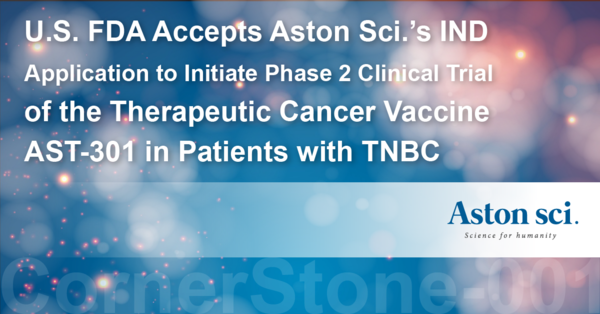Aston Science said on Wednesday that it obtained approval from the U.S. Food and Drug Administration for phase 2 clinical trials of its therapeutic cancer vaccine AST-301 on patients with triple-negative breast cancer (TNBC).

The company said it confirmed the excellent safety, immunogenicity, and survival rate of AST-301 by publishing phase 1 results, including a follow-up study of more than 10 years on breast cancer patients with HER2 expression, at the American Society for Clinical Oncology (ASCO) last year.
It added that this drug is expected to play a role in preventing cancer recurrence after surgery and treating progressive cancer as it has few side effects and maintains long-term immune memory compared to existing anticancer treatments.
The phase 2 clinical trial administers combinations with Xeloda or Keytruda, a standard treatment, in patients with a high risk of recurrence after HER2 low-expression breast cancer surgery.
Furthermore, the phase 2 clinical trial applies the same patient group and design used in phase 3 clinical trials. Depending on the interim results, it will enable discussion of expedited authorization of biological license application (BLA) or pivotal cohort expansion to generate corroborative clinical data in phase 2 clinical trials, the company said.
The company compared it to MSD's rapid licensing strategy using the results of the Keytruda clinical phase 1 study, adding that the strategy will enable faster patient recruitment by completing the approval of IND in the U.S. following Australia and Taiwan.
"Based on data from phase 1 clinical trials, including more than 10 years of long-term survival data, the U.S. FDA has fully reviewed and approved it, fully verifying the plasmid DNA vaccine in regulatory terms," said Choi Eun-young, Aston Science’s regulatory affairs director.
Chief Medical Officer (CMO) Joung Eun-kyo said, “The number of cancer survivors is rapidly increasing thanks to early cancer detection technologies,”
Joung said, “However, there are various side effects of chemotherapy, fears of recurrence, and social problems. We hope our therapeutic cancer vaccine will contribute to the management, prevention of recurrence, and recovery of overall quality of life for cancer survivors.”

